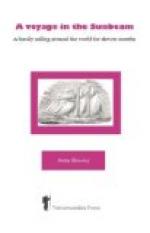From the theatre we drove to the Chinese hospital, and thence to the Chinese recreation ground, where we saw sundry itinerant quacks and vendors of all sorts of rubbish. As we were walking along, having left our chairs for a few minutes to look at the Chinese shops, a man picked my pocket of a one-dollar note. Mr. Freer and the Doctor saw, pursued, and caught him. He vehemently protested his innocence, but to no avail. They proceeded to strip him, found the note, gave him a good shaking, and told him to go.
Thursday, March 1st.—A most lovely morning ushered in the new month, which having come in like the most peaceable of lambs, will, we hope, not end like a roaring lion just as we expect to be in the middle of the Bay of Bengal. We left the yacht at 7.30, and went on board the ‘Kin-Shan,’ which is a regular American river steamer with beam engines and many deck-houses, which are painted white. The lower deck is crowded with the most inferior class of Chinese, some eight hundred of them being on board. It gave us rather a turn to see them all padlocked in under the hatchways and iron gratings. At each opening is posted an armed sentinel, ready to fire among the crowd in case of any disturbance. In the saloon, also, is a stand of pistols, and rifles with fixed bayonets, ready for the European passengers to defend themselves with, in case of emergency. These are very necessary precautions, on account of the numerous pirates who occasionally ship in disguise among the crowd, murder the passengers and crew, and take possession of the steamer. Not quite two years ago a vessel belonging to this same company was assailed in that way. Every one on board was murdered, and the ship taken to Macao.[19] But this voyage was more prosperous, the captain was most kind and polite, and the boat clean and comfortable. An excellent breakfast and an elaborate tiffin were served at noon, all for the sum of four dollars a head, including wine, beer, and spirits ad libitum.
[Footnote 19: I have since been told that only the captain and one or two passengers were killed, and the vessel run ashore near, not at Macao.]
On first leaving Hankow the course lies between islands and through fine mountain passes. Later on the country becomes flat and uninteresting till the Bogue Forts are reached. Here are to be seen the remains of the old forts knocked down by the French and English guns.
[Illustration: Bogue Forts.]
About one o’clock we reached Whampoa, the leading port of Canton. The Pearl River is too shallow for large steamers to go up any higher; so we stopped here only a few minutes to disembark some of the Chinese passengers, and from this point the interesting part of the voyage began. The river, as well as all the little supplementary creeks, was alive with junks and sampans—masts and sails stuck up in every direction, gliding about among the flat paddy-fields. Such masts and sails as they are! The mandarins’




